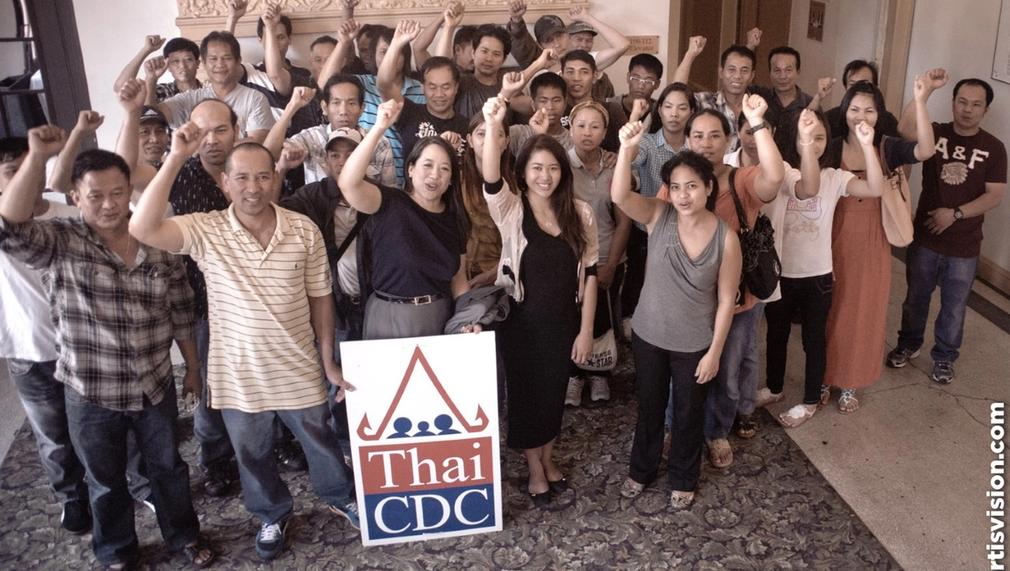Thai Workers Center
Thai CDC will organize Thai immigrant workers who will lay the groundwork necessary to start an immigrant workers' center that will be worker built and led. The center will transcend ethnic lines and organize workers across ethnic lines and service industries. However, it will be the first worker center in the country with the linguistic and cultural competency to serve Thai workers whose continuing invisibility, isolation, and marginalization only worsens their working conditions and undermines their ability to pursue justice.

What is the primary issue area that your application will impact?
Immigrant and Refugee Support
In which areas of Los Angeles will you be directly working?
Central LA
San Fernando Valley
In what stage of innovation is this project, program, or initiative?
Pilot or new project, program, or initiative
What is your understanding of the issue that you are seeking to address?
After 29 years of dedicated effort, we have found that strategies for economic development in the Thai community of Los Angeles has been undermined by the limitations imposed by the basic economic structure of the community. As long as Thai immigrants are employed primarily as unskilled workers in a service economy, they are subject to wage theft and exploitation which prevents them from taking advantage of every type of opportunity that Thai CDC has sought to provide them to exit the service economy and become self-sufficient. A Thai workers' center could be the catalyst for expanded economic opportunity for the Thai community that would greatly increase the success and impact of all our other community development work while advancing the struggle for immigrant and human rights. It could affirm the reality that innovative and radical approaches to alleviating poverty cannot substitute the impact of an empowered citizenry organized to demand equality and economic justice.
Describe the project, program, or initiative this grant will support to address the issue.
The project aims to create a Thai Worker Center (TWC) that will provide the vast majority of Thai immigrant laborers who work in the service economy with a platform that could help them turn a system of exploitation into an engine for economic self-sufficiency and participation. We envision this platform as an immigrant workers' center where Thai workers can learn about labor rights, find solidarity in each other, and organize, mobilize, and lead a movement to fight wage theft and demand justice from their employers. In the first year, we would hire a worker leader to recruit, educate, and empower at least 50 Thai speaking workers to participate in our program. The Center will start an English language acquisition program specifically geared towards Thai workers who are not available for traditional ESL classes. We will partner with local ESL programs to provide instruction and materials to at least 15 workers per semester. In addition, the TWC would provide navigational support for vocational skills building and job placement. It will partner with organizations like the Hospitality Training Academy and other vocational schools with apprenticeship opportunities to increase vocational skills and job placement. It will refer at least 50 workers to programs with job placement assistance.
Describe how Los Angeles County will be different if your work is successful.
The Thai immigrant community will have new pathways to become more economically mobile and have increased knowledge and means to pursue all means of worker justice. Having worked with Koreatown Immigrant Workers' Alliance and Pilipino Workers' Center for three decades to address the rights of immigrant workers, we will continue our collaboration with them by using their expertise in worker organizing to train our staff. We will build solidarity between workers across ethnic lines. We successfully organized Thai and Latinx immigrant workers during the Retailer Accountability Campaign to end sweatshops in the garment industry, before the Thai Garment Slavery Case was discovered and created a powerful immigrant workers' rights movement that led to Sweatshop Watch, Coalition to Abolish Slavery and Trafficking, and adoption of legislation to reform the garment industry. By institutionalizing workers' rights work, we will carry out the worker organizing beyond an ad hoc basis.
What evidence do you have that this project, program, or initiative is or will be successful, and how will you define and measure success?
As this is an early-stage project, we will define and and measure success according to the quantity of members we can outreach to and engage in labor organizing, quantity of enrollments in ESL programs, and quantity referred to apprenticeship programs.
Approximately how many people will be impacted by this project, program, or initiative?
Direct Impact: 100
Indirect Impact: 1,000